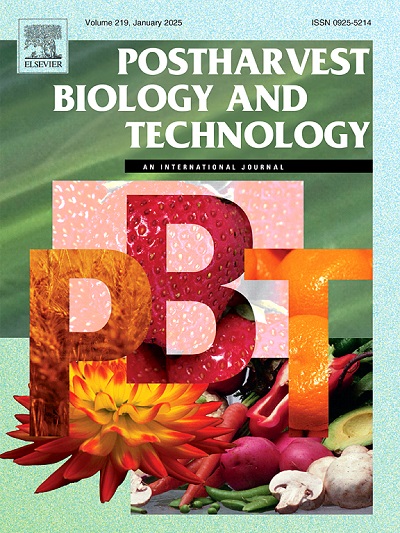通过高通量测序和生物信息学分析探索蓝色金银花的新型保存策略
IF 6.4
1区 农林科学
Q1 AGRONOMY
引用次数: 0
摘要
浆果的新陈代谢活动在收获后仍在继续,其质量和安全性受到各种外部和内部因素的影响,其中微生物污染是主要影响因素之一。冷藏是保鲜和延长货架期所必需的,但对冷藏期间浆果上微生物群落变化的了解仍处于起步阶段。本研究考察了冷藏期间蓝色金银花表皮微生物的多样性和动态变化。将蓝金银花在 4 °C下冷藏 0、4、8 和 12 d,通过 Illumina Novaseq 测序分析微生物群落。物种分布显示,真菌中以子囊菌和担子菌为主,细菌中以变形菌和固着菌为主,其丰度随时间波动。通过组织分离,成功分离并验证了交替Alternaria和Irpex lacteus是主要的致腐真菌。此外,还分离和筛选了乳酸菌,以抑制致腐真菌,其中粪肠球菌具有显著功效。对影响其活性的因素进行了评估,其中温度和 pH 值对其功效有影响。酶处理表明了肽在抑制中的作用。体内测试表明了其防腐功效,突出了生物防腐在贮藏期间保持质量的潜力。该研究的工作流程强调探索可在生物保鲜策略中实施的微生物生态干预措施,从而加强对浆果(尤其是蓝金银花)采后质量的了解和管理。本文章由计算机程序翻译,如有差异,请以英文原文为准。
Exploring novel preservation strategies for blue honeysuckle through high-throughput sequencing and bioinformatics analysis
Berries’ metabolic activities continue post-harvest, and their quality and safety are affected by various external and internal factors, with microbial contamination being one of the major influences. Refrigeration is necessary to preserve freshness and increase shelf life; however, understanding the changes in microbial communities on berries during refrigeration still is in its infancy. This study examines the diversity and dynamics of epidermal microbes on blue honeysuckle during refrigeration. Blue honeysuckle was refrigerated at 4 °C for 0, 4, 8, and 12 d, with microbial communities analyzed via Illumina Novaseq sequencing. Species distribution revealed dominant Ascomycota and Basidiomycota in fungi, Proteobacteria and Firmicutes in bacteria, with fluctuating abundance over time. Through tissue isolation, Alternaria alternata and Irpex lacteus were successfully separated and validated as predominant decay-causing fungi. Additionally, lactobacilli were isolated and screened for inhibiting decay-causing fungi, with Enterococcus faecium showing significant efficacy. Factors influencing its activity were evaluated, with temperature and pH impacting efficacy. Enzyme treatments indicated the role of peptides in inhibition. In vivo tests demonstrated preservation efficacy, highlighting bio-preservation potential for quality maintenance during storage. The study's workflow emphasizes exploring microbial ecological interventions that can be implemented in bio-preservation strategies, thereby enhancing understanding and management of post-harvest quality in berries, particularly blue honeysuckle.
求助全文
通过发布文献求助,成功后即可免费获取论文全文。
去求助
来源期刊

Postharvest Biology and Technology
农林科学-农艺学
CiteScore
12.00
自引率
11.40%
发文量
309
审稿时长
38 days
期刊介绍:
The journal is devoted exclusively to the publication of original papers, review articles and frontiers articles on biological and technological postharvest research. This includes the areas of postharvest storage, treatments and underpinning mechanisms, quality evaluation, packaging, handling and distribution of fresh horticultural crops including fruit, vegetables, flowers and nuts, but excluding grains, seeds and forages.
Papers reporting novel insights from fundamental and interdisciplinary research will be particularly encouraged. These disciplines include systems biology, bioinformatics, entomology, plant physiology, plant pathology, (bio)chemistry, engineering, modelling, and technologies for nondestructive testing.
Manuscripts on fresh food crops that will be further processed after postharvest storage, or on food processes beyond refrigeration, packaging and minimal processing will not be considered.
 求助内容:
求助内容: 应助结果提醒方式:
应助结果提醒方式:


